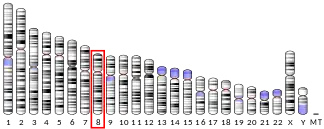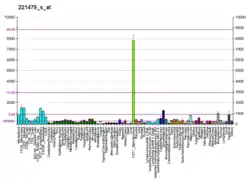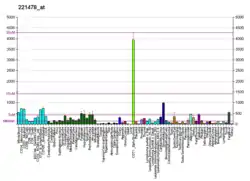BNIP3L
BCL2/adenovirus E1B 19 kDa protein-interacting protein 3-like is a protein that in humans is encoded by the BNIP3L gene.[4][5][6]
Function
This gene is a member of the BCL2/adenovirus E1B 19 kd-interacting protein (BNIP) family. It interacts with the E1B 19 kDa protein which is responsible for the protection of virally induced cell death, as well as E1B 19 kDa-like sequences of BCL2, also an apoptotic protector. The protein encoded by this gene is a functional homolog of BNIP3, a proapoptotic protein. This protein may function simultaneously with BNIP3 and may play a role in tumor suppression.[6]
References
- GRCh38: Ensembl release 89: ENSG00000104765 - Ensembl, May 2017
- "Human PubMed Reference:". National Center for Biotechnology Information, U.S. National Library of Medicine.
- "Mouse PubMed Reference:". National Center for Biotechnology Information, U.S. National Library of Medicine.
- Matsushima M, Fujiwara T, Takahashi E, Minaguchi T, Eguchi Y, Tsujimoto Y, Suzumori K, Nakamura Y (May 1998). "Isolation, mapping, and functional analysis of a novel human cDNA (BNIP3L) encoding a protein homologous to human NIP3". Genes Chromosomes Cancer. 21 (3): 230–5. doi:10.1002/(SICI)1098-2264(199803)21:3<230::AID-GCC7>3.0.CO;2-0. PMID 9523198. S2CID 45529298.
- Yasuda M, Han JW, Dionne CA, Boyd JM, Chinnadurai G (Feb 1999). "BNIP3alpha: a human homolog of mitochondrial proapoptotic protein BNIP3". Cancer Res. 59 (3): 533–7. PMID 9973195.
- "Entrez Gene: BNIP3L BCL2/adenovirus E1B 19kDa interacting protein 3-like".
- Passer BJ, Nancy-Portebois V, Amzallag N, Prieur S, Cans C, Roborel de Climens A, Fiucci G, Bouvard V, Tuynder M, Susini L, Morchoisne S, Crible V, Lespagnol A, Dausset J, Oren M, Amson R, Telerman A (Mar 2003). "The p53-inducible TSAP6 gene product regulates apoptosis and the cell cycle and interacts with Nix and the Myt1 kinase". Proc. Natl. Acad. Sci. U.S.A. 100 (5): 2284–9. Bibcode:2003PNAS..100.2284P. doi:10.1073/pnas.0530298100. PMC 151332. PMID 12606722.
External links
- Human BNIP3L genome location and BNIP3L gene details page in the UCSC Genome Browser.
Further reading
- Chen G, Cizeau J, Vande Velde C, Park JH, Bozek G, Bolton J, Shi L, Dubik D, Greenberg A (1999). "Nix and Nip3 form a subfamily of pro-apoptotic mitochondrial proteins". J. Biol. Chem. 274 (1): 7–10. doi:10.1074/jbc.274.1.7. PMID 9867803.
- Ohi N, Tokunaga A, Tsunoda H, Nakano K, Haraguchi K, Oda K, Motoyama N, Nakajima T (1999). "A novel adenovirus E1B19K-binding protein B5 inhibits apoptosis induced by Nip3 by forming a heterodimer through the C-terminal hydrophobic region". Cell Death Differ. 6 (4): 314–25. doi:10.1038/sj.cdd.4400493. PMID 10381623.
- Imazu T, Shimizu S, Tagami S, Matsushima M, Nakamura Y, Miki T, Okuyama A, Tsujimoto Y (1999). "Bcl-2/E1B 19 kDa-interacting protein 3-like protein (Bnip3L) interacts with bcl-2/Bcl-xL and induces apoptosis by altering mitochondrial membrane permeability". Oncogene. 18 (32): 4523–9. doi:10.1038/sj.onc.1202722. PMID 10467396.
- Wiemann S, Weil B, Wellenreuther R, Gassenhuber J, Glassl S, Ansorge W, Böcher M, Blöcker H, Bauersachs S, Blum H, Lauber J, Düsterhöft A, Beyer A, Köhrer K, Strack N, Mewes HW, Ottenwälder B, Obermaier B, Tampe J, Heubner D, Wambutt R, Korn B, Klein M, Poustka A (2001). "Toward a catalog of human genes and proteins: sequencing and analysis of 500 novel complete protein coding human cDNAs". Genome Res. 11 (3): 422–35. doi:10.1101/gr.GR1547R. PMC 311072. PMID 11230166.
- Passer BJ, Nancy-Portebois V, Amzallag N, Prieur S, Cans C, Roborel de Climens A, Fiucci G, Bouvard V, Tuynder M, Susini L, Morchoisne S, Crible V, Lespagnol A, Dausset J, Oren M, Amson R, Telerman A (2003). "The p53-inducible TSAP6 gene product regulates apoptosis and the cell cycle and interacts with Nix and the Myt1 kinase". Proc. Natl. Acad. Sci. U.S.A. 100 (5): 2284–9. Bibcode:2003PNAS..100.2284P. doi:10.1073/pnas.0530298100. PMC 151332. PMID 12606722.
- Aerbajinai W, Giattina M, Lee YT, Raffeld M, Miller JL (2003). "The proapoptotic factor Nix is coexpressed with Bcl-xL during terminal erythroid differentiation". Blood. 102 (2): 712–7. doi:10.1182/blood-2002-11-3324. PMID 12663450.
- Sun JL, He XS, Yu YH, Chen ZC (2004). "[Expression and structure of BNIP3L in lung cancer]". AI Zheng. 23 (1): 8–14. PMID 14720367.
- Fei P, Wang W, Kim SH, Wang S, Burns TF, Sax JK, Buzzai M, Dicker DT, McKenna WG, Bernhard EJ, El-Deiry WS (2005). "Bnip3L is induced by p53 under hypoxia, and its knockdown promotes tumor growth". Cancer Cell. 6 (6): 597–609. doi:10.1016/j.ccr.2004.10.012. PMID 15607964.
- Stepan H, Leo C, Purz S, Höckel M, Horn LC (2006). "Placental localization and expression of the cell death factors BNip3 and Nix in preeclampsia, intrauterine growth retardation and HELLP syndrome". Eur. J. Obstet. Gynecol. Reprod. Biol. 122 (2): 172–6. doi:10.1016/j.ejogrb.2005.01.017. PMID 16219518.
- Olsen JV, Blagoev B, Gnad F, Macek B, Kumar C, Mortensen P, Mann M (2006). "Global, in vivo, and site-specific phosphorylation dynamics in signaling networks". Cell. 127 (3): 635–48. doi:10.1016/j.cell.2006.09.026. PMID 17081983. S2CID 7827573.
This article is issued from Wikipedia. The text is licensed under Creative Commons - Attribution - Sharealike. Additional terms may apply for the media files.



